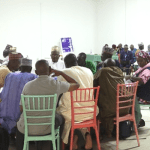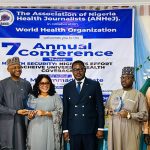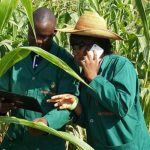The World Health Organization (WHO), in collaboration with Borno Ministry of Health, has commenced a three-day training on health reporting for journalists in Borno.
Speaking at the opening ceremony, the WHO Acting Emergency Manager, Dr Samuel Yenyi, said the training became necessary as effective communication remained key in containing outbreaks of diseases. “If we get the communication right, an outbreak that will take three months, could be address in few days,” Yenyi said.
He noted that the essence of the training was to prepare the journalists to support the health sector in ensuring effective communication whenever there was need to pass messages on health to the public.
Also speaking on objectives of the training, a facilitator with WHO, Mr Kingsley Igwebuike, said that the training would improve journalistic views and perspective on health reporting.
Igwebuike said that the training would also increase the preponderance of life-saving information, just as he stressed the role of WHO during emergencies.
“It will improve our public health knowledge; our roles as public health ambassadors, and also help us imbibe basic knowledge of risk communication,” Igwebuike said.
The World Health Organization (WHO), in collaboration with Borno Ministry of Health, has commenced a three-day training on health reporting for journalists in Borno.
Speaking at the opening ceremony, the WHO Acting Emergency Manager, Dr Samuel Yenyi, said the training became necessary as effective communication remained key in containing outbreaks of diseases. “If we get the communication right, an outbreak that will take three months, could be address in few days,” Yenyi said.
He noted that the essence of the training was to prepare the journalists to support the health sector in ensuring effective communication whenever there was need to pass messages on health to the public.
Also speaking on objectives of the training, a facilitator with WHO, Mr Kingsley Igwebuike, said that the training would improve journalistic views and perspective on health reporting.
Igwebuike said that the training would also increase the preponderance of life-saving information, just as he stressed the role of WHO during emergencies.
“It will improve our public health knowledge; our roles as public health ambassadors, and also help us imbibe basic knowledge of risk communication,” Igwebuike said.
The World Health Organization (WHO), in collaboration with Borno Ministry of Health, has commenced a three-day training on health reporting for journalists in Borno.
Speaking at the opening ceremony, the WHO Acting Emergency Manager, Dr Samuel Yenyi, said the training became necessary as effective communication remained key in containing outbreaks of diseases. “If we get the communication right, an outbreak that will take three months, could be address in few days,” Yenyi said.
He noted that the essence of the training was to prepare the journalists to support the health sector in ensuring effective communication whenever there was need to pass messages on health to the public.
Also speaking on objectives of the training, a facilitator with WHO, Mr Kingsley Igwebuike, said that the training would improve journalistic views and perspective on health reporting.
Igwebuike said that the training would also increase the preponderance of life-saving information, just as he stressed the role of WHO during emergencies.
“It will improve our public health knowledge; our roles as public health ambassadors, and also help us imbibe basic knowledge of risk communication,” Igwebuike said.
The World Health Organization (WHO), in collaboration with Borno Ministry of Health, has commenced a three-day training on health reporting for journalists in Borno.
Speaking at the opening ceremony, the WHO Acting Emergency Manager, Dr Samuel Yenyi, said the training became necessary as effective communication remained key in containing outbreaks of diseases. “If we get the communication right, an outbreak that will take three months, could be address in few days,” Yenyi said.
He noted that the essence of the training was to prepare the journalists to support the health sector in ensuring effective communication whenever there was need to pass messages on health to the public.
Also speaking on objectives of the training, a facilitator with WHO, Mr Kingsley Igwebuike, said that the training would improve journalistic views and perspective on health reporting.
Igwebuike said that the training would also increase the preponderance of life-saving information, just as he stressed the role of WHO during emergencies.
“It will improve our public health knowledge; our roles as public health ambassadors, and also help us imbibe basic knowledge of risk communication,” Igwebuike said.
The World Health Organization (WHO), in collaboration with Borno Ministry of Health, has commenced a three-day training on health reporting for journalists in Borno.
Speaking at the opening ceremony, the WHO Acting Emergency Manager, Dr Samuel Yenyi, said the training became necessary as effective communication remained key in containing outbreaks of diseases. “If we get the communication right, an outbreak that will take three months, could be address in few days,” Yenyi said.
He noted that the essence of the training was to prepare the journalists to support the health sector in ensuring effective communication whenever there was need to pass messages on health to the public.
Also speaking on objectives of the training, a facilitator with WHO, Mr Kingsley Igwebuike, said that the training would improve journalistic views and perspective on health reporting.
Igwebuike said that the training would also increase the preponderance of life-saving information, just as he stressed the role of WHO during emergencies.
“It will improve our public health knowledge; our roles as public health ambassadors, and also help us imbibe basic knowledge of risk communication,” Igwebuike said.
The World Health Organization (WHO), in collaboration with Borno Ministry of Health, has commenced a three-day training on health reporting for journalists in Borno.
Speaking at the opening ceremony, the WHO Acting Emergency Manager, Dr Samuel Yenyi, said the training became necessary as effective communication remained key in containing outbreaks of diseases. “If we get the communication right, an outbreak that will take three months, could be address in few days,” Yenyi said.
He noted that the essence of the training was to prepare the journalists to support the health sector in ensuring effective communication whenever there was need to pass messages on health to the public.
Also speaking on objectives of the training, a facilitator with WHO, Mr Kingsley Igwebuike, said that the training would improve journalistic views and perspective on health reporting.
Igwebuike said that the training would also increase the preponderance of life-saving information, just as he stressed the role of WHO during emergencies.
“It will improve our public health knowledge; our roles as public health ambassadors, and also help us imbibe basic knowledge of risk communication,” Igwebuike said.
The World Health Organization (WHO), in collaboration with Borno Ministry of Health, has commenced a three-day training on health reporting for journalists in Borno.
Speaking at the opening ceremony, the WHO Acting Emergency Manager, Dr Samuel Yenyi, said the training became necessary as effective communication remained key in containing outbreaks of diseases. “If we get the communication right, an outbreak that will take three months, could be address in few days,” Yenyi said.
He noted that the essence of the training was to prepare the journalists to support the health sector in ensuring effective communication whenever there was need to pass messages on health to the public.
Also speaking on objectives of the training, a facilitator with WHO, Mr Kingsley Igwebuike, said that the training would improve journalistic views and perspective on health reporting.
Igwebuike said that the training would also increase the preponderance of life-saving information, just as he stressed the role of WHO during emergencies.
“It will improve our public health knowledge; our roles as public health ambassadors, and also help us imbibe basic knowledge of risk communication,” Igwebuike said.
The World Health Organization (WHO), in collaboration with Borno Ministry of Health, has commenced a three-day training on health reporting for journalists in Borno.
Speaking at the opening ceremony, the WHO Acting Emergency Manager, Dr Samuel Yenyi, said the training became necessary as effective communication remained key in containing outbreaks of diseases. “If we get the communication right, an outbreak that will take three months, could be address in few days,” Yenyi said.
He noted that the essence of the training was to prepare the journalists to support the health sector in ensuring effective communication whenever there was need to pass messages on health to the public.
Also speaking on objectives of the training, a facilitator with WHO, Mr Kingsley Igwebuike, said that the training would improve journalistic views and perspective on health reporting.
Igwebuike said that the training would also increase the preponderance of life-saving information, just as he stressed the role of WHO during emergencies.
“It will improve our public health knowledge; our roles as public health ambassadors, and also help us imbibe basic knowledge of risk communication,” Igwebuike said.













